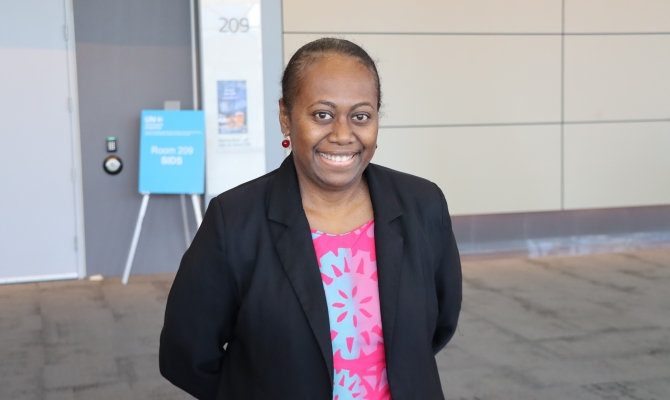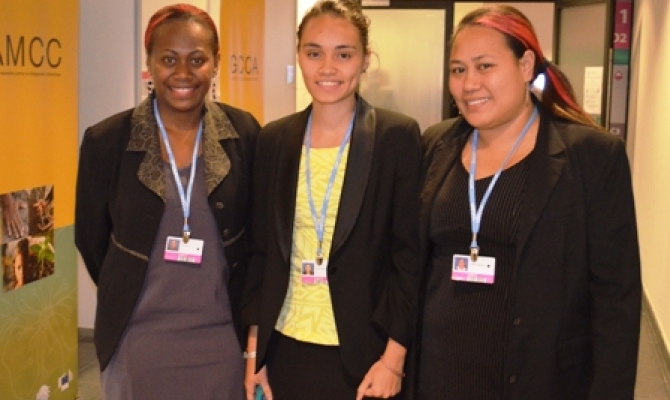
Negotiating a Legally Binding Instrument on Plastic Pollution including in the Marine Environment
24 April 2024, Ottawa Canada - Seeing this Pacific Island woman still active in the UN negotiation space is rewarding given the first time she was featured in news by the Secretariat of the Pacific Regional Environment Programme was as a university student undertaking intern work during the UN Climate Change Conference of the Parties Doha Qatar in 2012.
Back then, Diana Hinge Salili from Vanuatu, was part of the Climate Change Programme at the University of the South Pacific attending under the delegation of Nauru who was Chair of the Alliance of Small Islands States at that time. Through a project funded by AusAID, Diana was one of five students assigned to a negotiation thread across a two year period, supporting AOSIS having completed a few training courses and negotiations workshops.
Now, a decade on, Diana has represented Vanuatu at four different UN Climate Change Conferences of the Parties, and here in Ottawa Canada, she is attending the fourth session of the Intergovernmental Negotiations Committee on plastic pollution including in the marine environment, for the first time.
“I learnt a lot from the capacity building component of the USP PACE-SD Climate Change Programme. We were thrown into the deep end, but we were guided by very supportive members of Nauru who were the Chair of AOSIS at the time,” said Diana.

“It was there that I learnt on my feet about how negotiations work and all the behind-the-scenes preparatory work that happens. It was a real honour to be able to watch our Pacific Islands at work in the international negotiations.”
Since then, Diana has supported the Vanuatu Government in different capacities with her most recent UN Climate Change Conference of the Parties being COP28 in Dubai last year following a specific negotiations thread which has helped her hone her skills. Focusing her lens on Climate Finance has allowed her to streamline her skill set and provide the necessary support to undertake, and negotiate on behalf of Vanuatu, at the table with over 190 Parties to the UNFCCC.
The lessons she has learnt over her years on the Vanuatu delegation include building your knowledge as much as you can by learning from different people, and the importance of consistency and continuation in a national delegation.
“If you are new to the negotiations, having prior training and workshops really does help but its not until you are actually there that you realise in spite of all of this your first UN negotiation is like jumping in the deep end of the ocean,” said Diana.
“The best experience is actual learning while there. Sometimes the pace of negotiations is slow and sometimes its fast – but it can also be spread across many different Conferences of the Parties, and this is where continuation on a delegation helps. You are negotiating with a team that has experience in a particular area but is also familiar with each other when it comes to working under stressful conditions and long hours.”
Attending the INC4 is a new experience for Diana, however she has found that the lessons learnt remain the same. Her advice for Pacific Island women interested in exploring a career or experience in the multilateral environment negotiation space is sound advice – remembering that a nurtured team is a strong negotiations team.
“I think it would be a great step to identify your niche within the negotiations you are attending and build a strong team that you are working with. It’s important to keep in constant contact both during the negotiations and afterwards also. I’d also recommend that you engage in contributing to national submissions to be presented for international negotiations as this helps you understand the process better as well as how your island nation plays a role in this. And finally - constantly challenge yourself to improve each time and find ways you can better represent your country at the negotiations. Just keep learning and growing!”
The fourth Intergovernmental Negotiating Committee to develop an international legally binding instrument on plastic pollution, including in the marine environment is taking place in Ottawa, Canada, from 23-29 April 2024.
The Pacific Islands are represented by the Cook Islands, Federated States of Micronesia, Fiji, Kiribati, Marshall Islands, Nauru, Niue, Palau, Papua New Guinea, Samoa, Solomon Islands, Tonga, Tuvalu and Vanuatu through the support of the Government of Australia and the United Nations.
They are supported by the Secretariat of the Pacific Regional Environment Programme (SPREP), working with partners the Pacific Islands Forum Secretariat (PIFS), Office of the Pacific Ocean Commissioner (OPOC), The Pacific Community (SPC), Forum Fisheries Agency (FFA), Environmental Investigation Agency (EIA), Centre for International Environmental Law (CIEL), University of Wollongong, WWF and Massey University.
For more information, visit: https://www.unep.org/inc-plastic-pollution/session-4